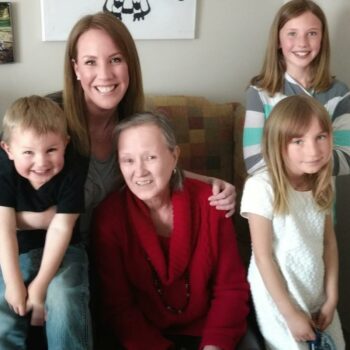Lesley Hawke

This disease is the most difficult thing I have had to deal with in my life. Some nights I lie in bed and scream or cry at the top of my lungs while my husband holds my hand. One of my daughters is very quiet and internalizes her feelings about this experience, so I invite her to talk to me as much as possible so she can get what she’s feeling off her chest.
March 8th, 2018
Lesley Hawke is a caregiver to her mother, who has Alzheimer’s disease.
My mother began experiencing memory problems about eight years ago. We noticed she would repeat stories, lose items such as her phone or keys and show up to our house several times per day, appearing to forget that she had visited an hour before. My mother mentioned she was worried about her memory, but said she did not want to go on medication due to possible side effects. Her memory began getting worse around the time my son was born three years ago. She began calling our home ten times per day and visiting up to five times each day. Like my mother, her doctor brushed these issues off, since she completed the MoCA and everything appeared normal. One night, she drove herself to the hospital after experiencing ankle pain. We had to file a missing person’s report with the police because she was missing the entire night. She came back home around 4 a.m. and had forgotten where she went. After my husband took my mother back to the doctor and demanded the doctor do something, my mother was hospitalized, and she eventually moved into an assisted care facility where she lived for two years. However, the facility then said they did not have the resources to assist my mother at this stage in the disease, so she had to move to the long-term care facility where she now lives.
This disease is the most difficult thing I have had to deal with in my life. My daughters, who are 11 and 7 years old, struggle to understand what is happening to their beloved Mimi. My three-year-old son will never truly know his grandmother, and I tear up each time I think of that. I struggle to help them understand a disease that I do not fully understand myself. Some nights I lie in bed and scream or cry at the top of my lungs while my husband holds my hand. When I visit my mother, I try to put on a brave face and pretend as if life is normal, despite her not knowing who I am.
There is a lot of advice I would give to other caregivers going through a similar experience who want to discuss Alzheimer’s with their children. The Alzheimer’s Association near my house has been very useful with helping me find a counselor to describe this experience to them. Since this disease will likely not get any better, I think it’s important to ease their fears and help them navigate their emotions. Try locating an association near you if you want to find a counselor for your children. Also, try not to give your children false hope when discussing this disease. This experience is horrific for them to go through, but I try to be as open as possible about what will happen and remind them that each time we visit Mimi, she may be different. They often have a lot of anxiety about visiting their grandmother since the experience is tough on them. Each week, I have to weigh the benefits versus costs and determine if a visit will help them. One of my daughters is very quiet and internalizes her feelings, so I invite her to talk to me as much as possible so she can get what she’s feeling off her chest.
I also think that if your parent has Alzheimer’s, you should be kind to yourself. Try to be open with friends and relatives about what your loved one is experiencing. I try to provide status updates for family members on social media about my mother. I believe being open is important because sharing your story makes others feel less alone. I noticed that after I began providing these updates, people who I knew from back home started to contact me and said, “Oh my goodness, my dad’s going through the same thing.” People may have felt as if they didn’t have anyone else to talk to, but sharing your story will encourage them to contact you so you can share resources with one another.
In addition, try to reminiscence and share old photos with your loved one. Sing or read to them, hold their hands, and rub their fingers. Spread awareness about the disease because it’s becoming more prevalent, and you should not feel embarrassed or ashamed. We need to educate others, and I believe hearing personal stories will help. Spend as much time with your loved one as possible, doing activities that will attach you to that person. You never know how much longer he or she has. Quality of life is important, so just try to meet them where they’re at.